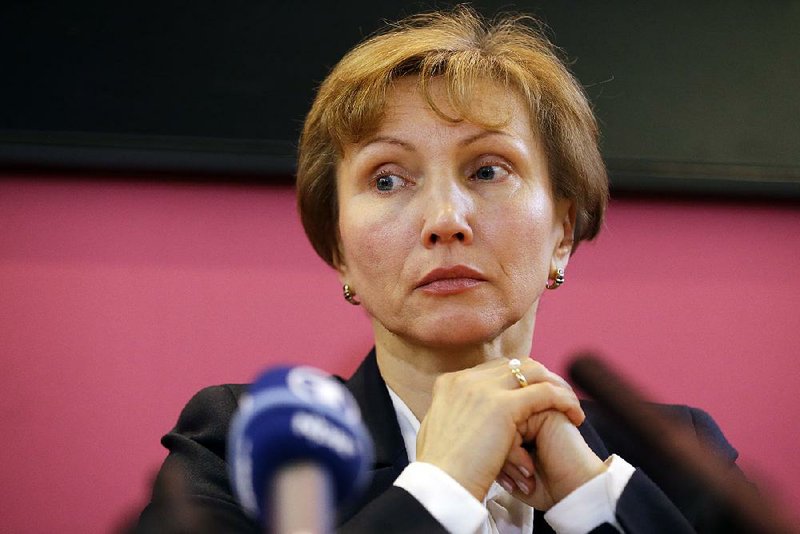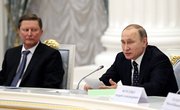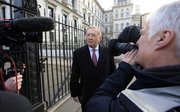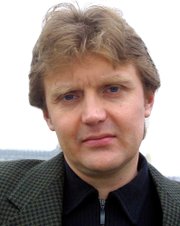LONDON -- A British judge issued a report Thursday that said President Vladimir Putin "probably approved" a plan by Russia's FSB security service to kill Alexander Litvinenko, a former agent turned Kremlin critic who died in 2006.
Russia responded by accusing the United Kingdom of a politically motivated attack.
Judge Robert Owen, who led a public inquiry into Litvinenko's death, said he was certain that two Russian men had given Litvinenko tea containing a fatal dose of polonium-210 during a meeting at a London hotel.
He said there was a "strong probability" that Russia's FSB, successor to the Soviet Union's KGB spy agency, directed the killing and that the operation was "probably approved" by Putin, in his second term as president at the time.
"There were powerful motives for organizations and individuals within the Russian state to take action against Mr. Litvinenko, including killing him," Owen wrote in the 326-page report.
Owen did not provide any direct evidence linking Putin or any other high-level Russian officials to the killing, and he acknowledged that he had based his findings on "strong circumstantial evidence of Russian state responsibility."
Owen said Litvinenko had "personally targeted President Putin himself with highly personal public criticism," allied himself with Putin's opponents and was believed to be working for British intelligence.
Litvinenko himself said he was working for Britain's spy services, though British authorities have never confirmed it.
On his deathbed, Litvinenko accused Putin of ordering his killing, but this is the first official public statement linking Putin to the crime.
British Prime Minister David Cameron said the evidence of "state-sponsored" killing was "absolutely appalling." The U.K. summoned the Russian ambassador for a dressing-down Thursday and imposed an asset freeze on the two main Russian suspects: Andrei Lugovoi, now a Russian lawmaker, and Dmitry Kovtun, described now as a Russian businessman.
Russia has denied being involved in Litvinenko's death and accused the U.K. on Thursday of conducting a secretive and politically motivated inquiry. Putin spokesman Dmitry Peskov told reporters in Moscow that the "quasi-investigation" would "further poison the atmosphere of our bilateral relations."
He said the report "cannot be accepted by us as a verdict."
Russian Foreign Ministry spokesman Maria Zhakarova said the Russian government did not consider Owen's conclusions objective or impartial.
"There was one goal from the beginning: slander Russia and slander its officials," Zhakarova told journalists Thursday. She repeated several times that the Litvinenko inquiry was neither public nor transparent, claiming it had turned into a "shadow puppet theater."
"We regret that the strictly criminal case has been politicized and has darkened the general atmosphere of bilateral relations," she added. "Certainly, we need some time to thoroughly analyze the contents of this document, after which we will issue our detailed review."
Having worked in counterintelligence for the KGB and its successor, the FSB, Litvinenko was fired in 1998 after holding a news conference in which he was sharply critical of the agency, which was led by Putin at the time.
Litvinenko fled to the U.K. in 2000 and became a vocal critic of Russia's security service and of Putin, whom he accused of links to organized crime. Litvinenko also assisted Spanish intelligence agencies with their investigations into Russian crime networks.
Owen said Litvinenko "was regarded as having betrayed the FSB" with his actions, and said "there were powerful motives for organizations and individuals within the Russian state" to kill him.
Widow urges sanctions
Marina Litvinenko, the spy's widow, said she was "very pleased that the words my husband spoke on his deathbed when he accused Mr. Putin have been proved by an English court."
She also called for tougher action, urging Cameron to expel Russian intelligence agents operating in Britain and impose economic sanctions and travel bans on Putin and other officials linked to what her lawyer, Ben Emmerson, called an act of "terrorism on the streets of London."
"It's unthinkable that the prime minister would do nothing in the face of the damning findings," Marina Litvinenko told reporters.
U.K.-Russian relations have remained chilly since the killing of Litvinenko, who was granted British citizenship shortly before his death, and they worsened with Russia's involvement in the separatist fighting in Ukraine. But the inquiry's report comes as the two countries are cautiously trying to work together against the Islamic State in Syria.
British Home Secretary Theresa May said the involvement of the Russian state was "a blatant and unacceptable breach of the most fundamental tenets of international law and civilized behavior" -- but not a surprise. She announced asset freezes against suspects Lugovoi and Kovtun, and said Interpol had issued notices calling for their arrest if they traveled abroad. Russia refuses to extradite the two men.
Emmerson acknowledged that the two would not stand trial until "the final fall of Vladimir Putin."
Lugovoi is a member of the Russian parliament, which means he is immune from prosecution in his country. In an interview Thursday, he called the British investigation a "spectacle."
"I think that -- yet again -- Great Britain has shown that anything that involves their political interests, they'll make a top priority," Lugovoi said. "These announcements from the British Parliament completely discredit the British legal system -- completely -- in the eyes of any sensible, normal person."
Lugovoi also claimed he would have liked to testify at the inquiry but "was not allowed." The judge said both Lugovoi and Kovtun declined to give evidence.
Kovtun said the conclusions were based on "false evidence" presented in closed hearings. "The crazy evidence is easily refuted," the Tass news agency reported him as saying.
Lead-lined coffin
The British inquiry, which began almost one year ago, was called after Marina Litvinenko pressed for a full accounting of her husband's death.
Owen -- a retired High Court judge appointed by the British government to head a public inquiry into the slaying -- heard from dozens of witnesses during months of public hearings last year and also saw secret British intelligence evidence.
Announcing his findings at London's Royal Courts of Justice, Owen said "there can be no doubt that Alexander Litvinenko was poisoned by Mr. Lugovoi and Mr. Kovtun" in the Pine Bar of London's luxury Millennium Hotel on Nov. 1, 2006.
Litvinenko spent three agonizing weeks in a London hospital, during which his hair fell out and his organs failed. A urine test conducted by a doctor on a hunch shortly before Litvinenko's death revealed the presence of polonium-210, an isotope that is deadly if ingested in tiny quantities.
He lapsed into unconsciousness Nov. 22, after telling his wife he loved her and died of heart failure the next day at age 43. His body was so radioactive that he was buried in a lead-lined coffin in London's Highgate Cemetery.
From the beginning, the killing raised questions in London about the potential involvement of Putin and Nikolai Patrushev, the head of the FSB, at the time of Litvinenko's death.
In his report, Owen said that based on the evidence he had seen, "I find that the FSB operation to kill Mr. Litvinenko was probably approved by Mr. Patrushev and also by President Putin."
The judge laid out the overwhelming scientific evidence against Lugovoi and Kovtun, including a trail of radiation that stretched from the hotel teapot to the sink in Kovtun's room and even the Emirates stadium in London, where Lugovoi attended a soccer game.
Owen, however, while writing that he believed the two men knew they were using a deadly poison, suggested that they were not aware "precisely what the chemical that they were handling was, or the nature of all its properties."
Owen said the method of killing, with radioactive poison, fit with the deaths of several other opponents of Putin and his government, and noted that Putin had "supported and protected" Lugovoi since the killing, even awarding him a medal for services to the nation.
Information for this article was contributed by Jill Lawless, Katherine Jacobsen, Lynn Berry, Vitnija Saldava and Sylvia Hui of The Associated Press; by Alan Cowell and Ivan Nechepurenko of The New York Times; and by Griff Witte, Michael Birnbaum and Karla Adam of The Washington Post.
A Section on 01/22/2016



